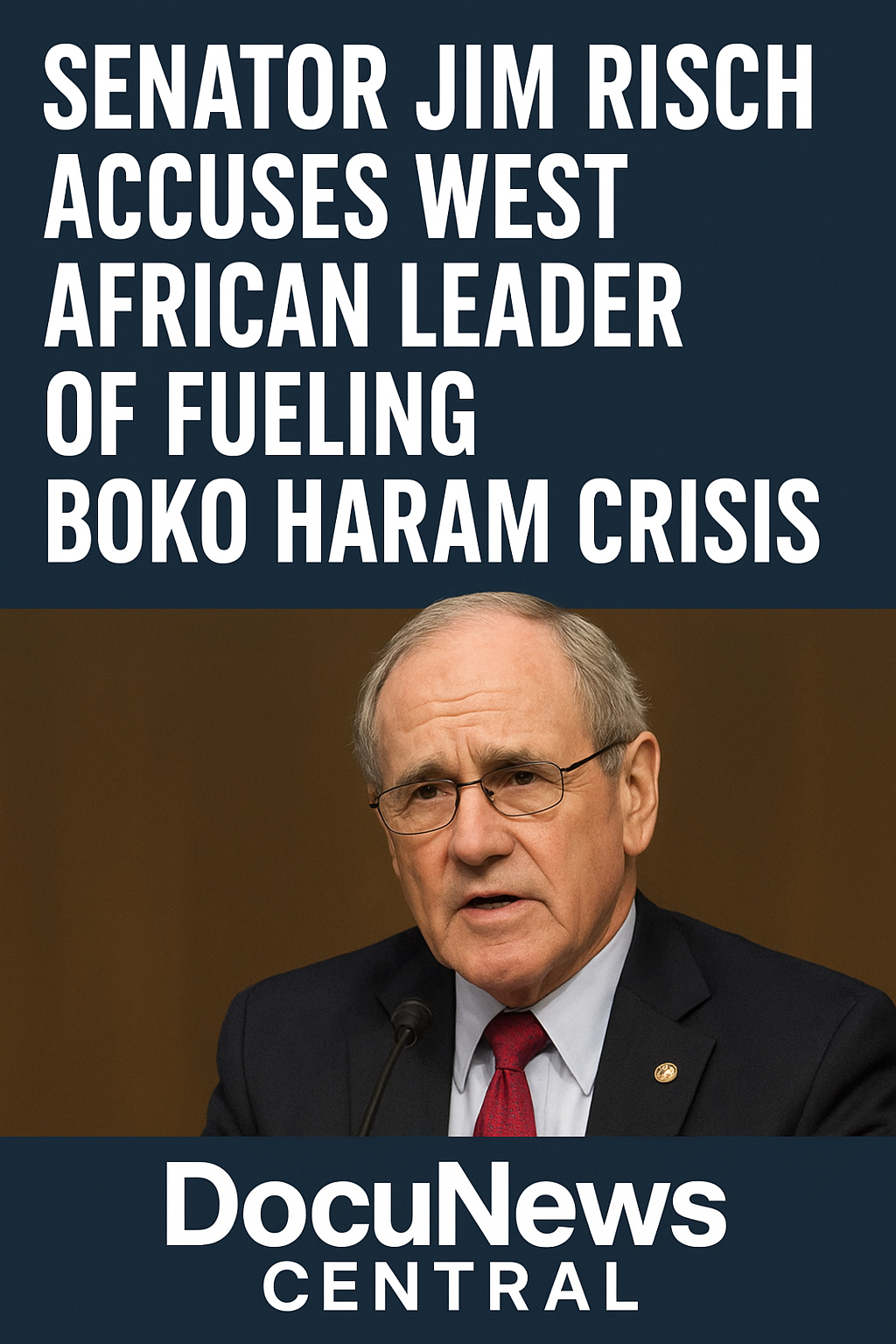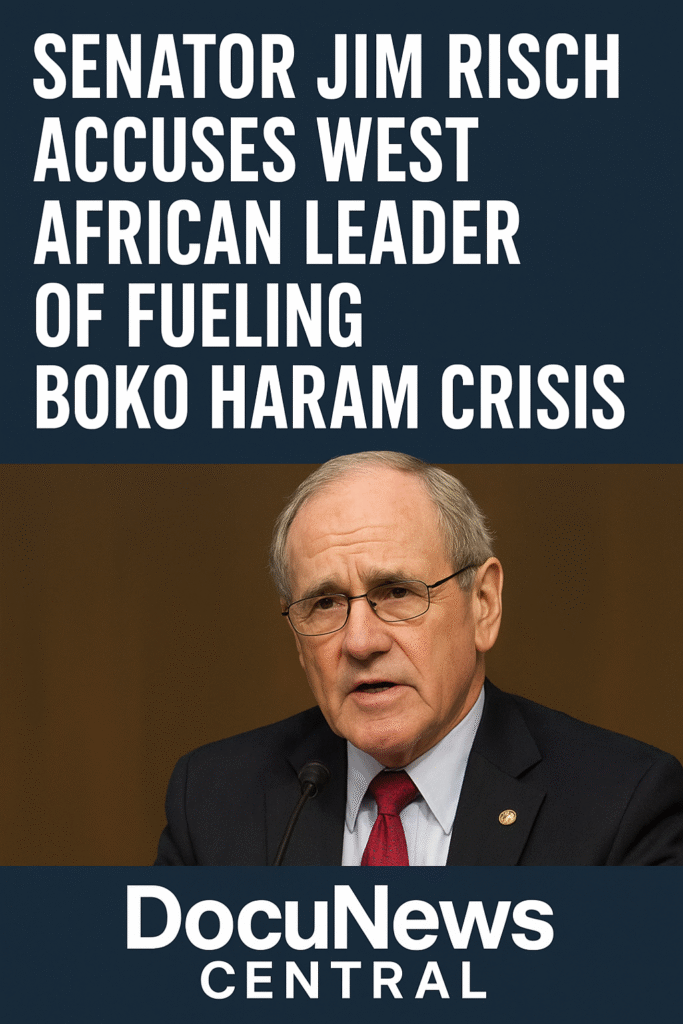

In a powerful statement, U.S. Senator Jim Risch has accused a West African president of fueling terrorism by allowing weak governance and corruption to enable extremist groups like Boko Haram and ISIS to thrive. His comments have drawn global attention and sparked debate about the true root causes of instability in the region.
Understanding Senator Risch’s Allegations
Senator Risch’s statement focused on Cameroon’s leadership under President Paul Biya, criticizing the government for creating conditions that have empowered Boko Haram and ISIS affiliates. He described the regime as “corrupt and dangerous to American interests” and accused it of “enabling Wagner’s illicit activities and jihadist movements.”
Risch also condemned what he called a “sham re-election” and the unlawful detention of U.S. citizens, suggesting that democratic and human-rights failings have worsened Cameroon’s instability. According to him, poor governance has allowed extremist groups to recruit easily and spread chaos across the Lake Chad Basin.
The Rise of Boko Haram and Regional Crisis
Boko Haram began as a Nigerian extremist movement before expanding into neighboring countries. After pledging allegiance to ISIS, it transformed into the Islamic State’s West Africa Province (ISWAP). Over the years, their attacks have destroyed communities, displaced millions, and destabilized the entire Lake Chad region.
Cameroon’s northern regions share borders with Nigeria, where Boko Haram is strongest. This proximity has turned Cameroon into a key battleground. Weak institutions, corruption, and civil unrest—particularly the ongoing Anglophone crisis—have left the country vulnerable to infiltration by terrorist groups.
Why Senator Risch Targeted Cameroon
Analysts believe Risch’s public rebuke of Cameroon is deliberate. As chairman of the U.S. Senate Foreign Relations Committee, his words carry significant diplomatic weight. He is likely signaling that Washington may reconsider its relationship with Yaoundé unless reforms are made.
His statement reflects growing frustration among U.S. policymakers that billions in security aid to Africa are not yielding expected results. The senator’s message is clear: without genuine governance reform, foreign military support alone cannot defeat terrorism.
Implications for U.S. Foreign Policy
The senator’s remarks could lead to several policy changes:
- Conditional aid: U.S. support may become tied to measurable democratic reforms and human-rights improvements.
- Diplomatic pressure: Washington might publicly call for transparency and accountability within Cameroon’s security forces.
- Strategic shifts: The U.S. could strengthen ties with other regional partners like Nigeria and Chad instead.
This is not the first time the U.S. has voiced concerns over West African governance. In related developments, Peter Obi recently urged diplomatic engagement between Nigeria and the U.S. amid tensions over alleged human-rights issues. These interconnected events show Washington’s renewed interest in ensuring stability through governance reform, not just military intervention.
Regional and Domestic Reactions
While Cameroon’s government has not officially responded, diplomatic observers say the criticism will intensify internal and external pressure on President Biya. Civil society groups are likely to use the statement as leverage to demand transparency, fair elections, and an end to unlawful detentions.
Meanwhile, other African nations are paying attention. The message resonates across West Africa: corruption and authoritarianism breed insecurity. Nations plagued by similar issues could face similar international scrutiny if reforms are delayed.
Governance: The Real Weapon Against Terrorism
Experts agree that counterterrorism is not won solely with weapons. The true battle is for effective governance. Extremist groups thrive in regions where citizens feel abandoned, persecuted, or excluded from national decision-making.
Senator Risch’s statement underscores a critical truth: to defeat terrorism, nations must address poverty, injustice, and corruption—the very tools terrorists exploit to gain recruits. Cameroon’s leadership, therefore, faces a historic test: reform or risk collapse.
What Cameroon Must Do Next
To restore credibility and rebuild trust with both citizens and the international community, Cameroon should:
- Conduct transparent elections to ensure legitimacy.
- Release political prisoners and uphold the rule of law.
- Reform its military approach to focus on protecting civilians.
- Collaborate more closely with regional partners to tackle cross-border threats.
- Invest in education and development to counter extremist narratives.
Failure to act could isolate the regime further and encourage extremist movements to expand unchecked.
Lessons for Nigeria and the Region
Nigeria, Chad, and Niger face similar challenges. They too must improve governance to maintain credibility in the fight against Boko Haram. A previous analysis on Nigeria’s insecurity highlights that corruption and political instability remain key obstacles to peace.
The takeaway is simple: when citizens lose faith in their government, extremist groups step in to fill the vacuum. Stability, therefore, depends not just on military success but on justice, equality, and opportunity.
Why Senator Risch’s Remarks Matter
By publicly criticizing a sitting African president, Senator Risch has set a precedent. His statement could encourage both international partners and African citizens to demand accountability from their leaders. It also emphasizes the interconnectedness of governance and security—poor leadership anywhere can create instability everywhere.
Conclusion
Senator Jim Risch’s warning to Cameroon’s leadership serves as a wake-up call to all of West Africa. His message is clear: enabling terrorism through corruption and repression is unacceptable. If the region hopes to defeat Boko Haram, ISIS, and other extremist movements, it must prioritize governance reforms, uphold democracy, and protect human rights.
The path to peace in West Africa runs not through the battlefield but through the ballot box, transparency, and justice. That is the heart of Risch’s message—and one that the world should take seriously.
Related Posts:






